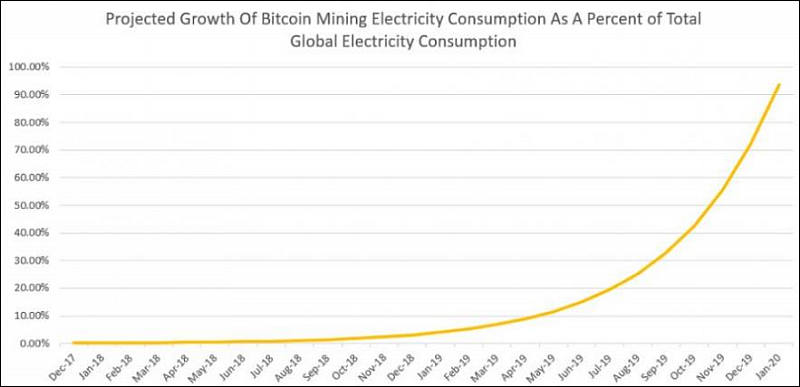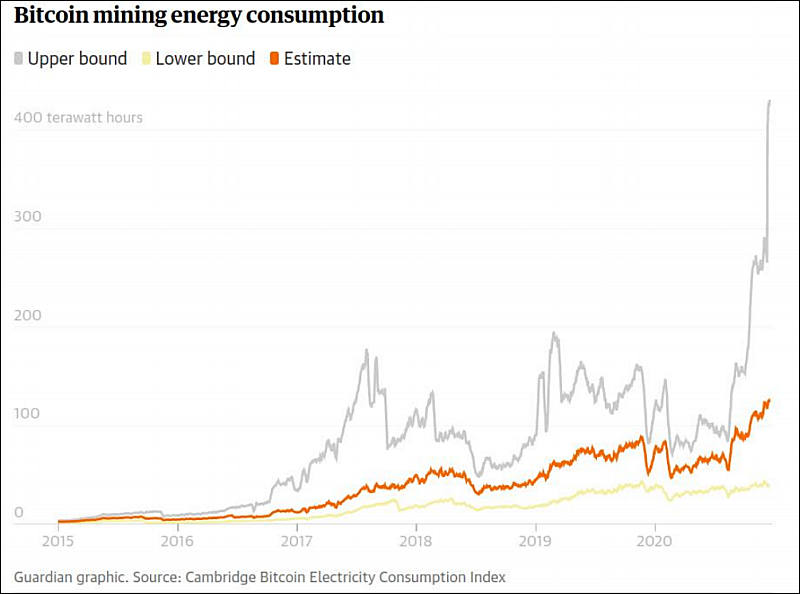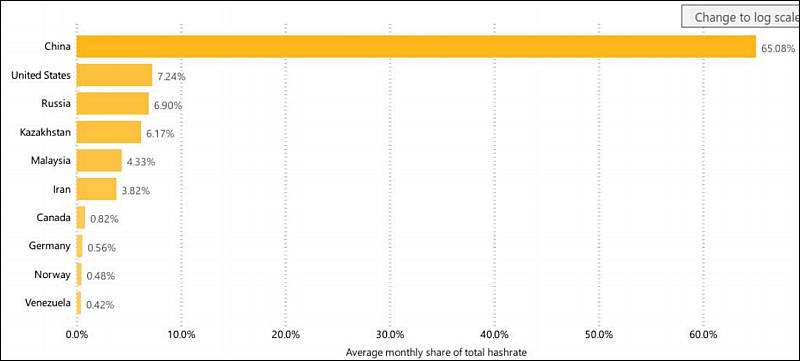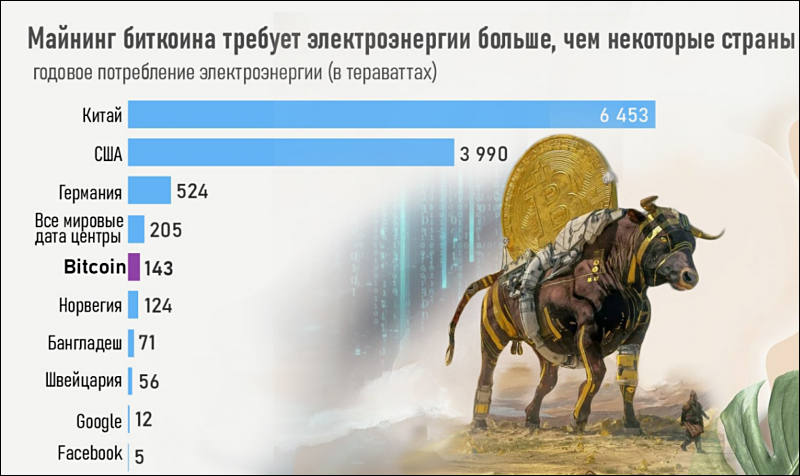
-
Analysis of how much energy it currently requires to mine bitcoin suggest that it is greater than the current energy consumption of 159 individual countries, including Ireland, Nigeria and Uruguay. The Bitcoin Energy Consumption Index by cryptocurrency platform Digiconomist puts the usage on a par with Denmark, consuming 33 terawatts of electricity annually
The bitcoin network’s energy consumption has increased by 25 percent in the last month alone, according to Digiconomist. If such growth were to continue, this would see the network consume as much energy as the U.S. by 2019, and as much energy as the entire world by the end of 2020.
We really need to shoot capitalism in his stupid head.
-
China’s central bank told a top-level government internet finance group that the monetary authority can tell local governments to regulate the power usage of bitcoin miners to gradually reduce the scale of their production.
-
I am waiting for this ethereum mining craze to implode, so that GPU prices might come back down.
As I understand it, the switch to a POS (proof of stake, not "piece of sh*|") system will render all the multi GPU rigs useless? It might be happen soon? Or, no one really knows, except the few who are in charge?
-
Bitcoin is the pinnacle of parasitism
Burning energy (making life worse!) to redistribute already produced goods and services (again, making life worse for everyone, but parasites!).
-
@CFreak: So far, "proof of stake" is only a hypothetical replacement for "proof of work" in crypto-currencies. I for one do not think that people will trust foreign anonymous entities to be in control of a block chain, just because those entities have amassed a large share of that currency.
To me, a better alternative to "proof of (useless hashing) work" would be some "proof of useful work" concept, where the right to add a block to the blockchain is gained by proving to have produced some real-world product or service.
-
To me, a better alternative to "proof of (useless hashing) work" would be some "proof of useful work" concept, where the right to add a block to the blockchain is gained by proving to have produced some real-world product or service.
Well, it is like proposing to drunken scammer to hang himself, with good manners, of course.
-
"The website Digiconomist estimates that the entire bitcoin network currently consumes just over 46 terawatt hours of energy every year," he wrote in an op-ed in the Frankfurter Allgemeine Zeitung, a major German newspaper, on February 4.
"This is almost as much as the annual energy consumption of Portugal, with its population of roughly 10 million. Simply settling a transaction in the bitcoin network consumes around 427 kilowatt hours. This amount of energy is enough to supply an average German four-person household with electricity for more than a month. By way of comparison, just settling a standard SEPAtransfer (without the payer initiating the transfer or checking their account balance on a PC or smartphone) takes less than one watt-hour. On the whole, the Bundesbank estimates that settling a bitcoin transaction uses roughly 460,000 times as much electricity as a normal transfer."
-
Bitcoin, one of the most popular cryptocurrencies, currently uses almost as much power as Ireland does, and could be consuming about 0.5% of the world’s total electricity by the end of this year, a study has found.
The estimates, based in economics, put the minimum current usage of the bitcoin network at 2.55 gigawatts, which means it uses almost as much electricity as Ireland. A single transaction uses as much electricity as an average household in the Netherlands uses in a month. By the end of this year, he predicts the network could be using as much as 7.7 gigawatts—as much as Austria and 0.5% of the world’s total consumption.
-
Bitcoin has a carbon footprint comparable to that of New Zealand, producing 36.95 megatons of CO2 annually, according to Digiconomist’s Bitcoin Energy Consumption Index, an online tool created by data scientist Alex de Vries. It consumes as much power as Chile — around 77.78 TWh — according to Digonomist’s estimates.
The Cambridge Bitcoin Electricity Consumption Index, a separate tool from researchers at Cambridge University, shows a much larger figure of 110.53 TWh — more than the entire annual energy consumption of the Netherlands.
This must be stopped and I prefer more violent way.
-
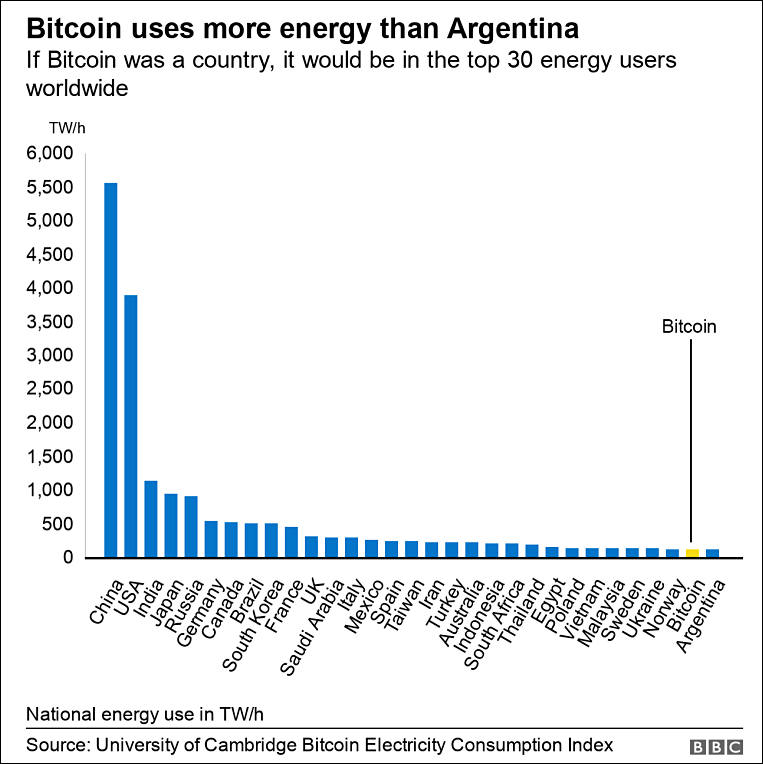
People who organized and did this will be listed in the same lists soon as neo nazis who eliminated hundreds of thousands of people. As this guys do the same - transferring energy and resources into waste so poor people no longer have access to them. Here misery and deaths are just not instantly visible.

 sa16427.jpg763 x 764 - 82K
sa16427.jpg763 x 764 - 82K -
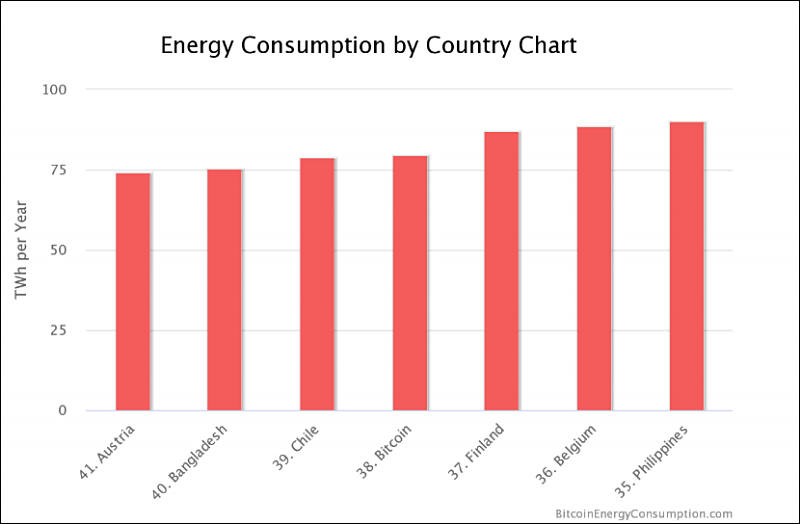
In 2019, Christian Stoll and his team conducted a study and calculated the annual range of carbon emissions from Bitcoin's mining capacity. They got values from 22.0 to 22.9 million tons of CO2 - the equivalent of carbon dioxide emitted by a US city like Kansas City. In the November 2018 carbon emissions ranking, Bitcoin ranked between Jordan and Sri Lanka (82nd and 83rd in terms of emissions). Since then, Bitcoin's carbon footprint has only increased.
Currently (March 2021), the carbon footprint of the Bitcoin network is already estimated at 37.82 million tons of CO2. Which is comparable to the carbon dioxide emissions of a country like Slovakia.

 sa16696.jpg800 x 524 - 39K
sa16696.jpg800 x 524 - 39K -
A study on the impact of cryptocurrency mining on carbon emissions was conducted by scientists from Tsinghua University and the Chinese Academy of Sciences. After modeling and mathematical analysis of the situation with Bitcoin mining in China, it was found that in 2024 296.59 TWh of electricity will be spent on mining. To generate such a volume of electricity, it will be necessary to burn such an amount of fossil fuels that will emit 130.5 million tons of carbon into the atmosphere. This is comparable to emissions from the Czech Republic and Qatar combined.
According to the researchers, a carbon tax alone is not enough in this case. Miners won't stop using electricity. In this case, the requirement to restructure electricity consumption with the transfer of cryptocurrency mining to a share or completely to "green" energy can help in this case. Only the central authorities can solve this problem.
Chinese elites are rotten now as they allow total scam to thrive.
People I talked with (inside China) tell that crypto scam is loved by local clerks and some business as it allows them to channel their illegal income outside country.
-
The global Bitcoin mining network uses 66 times more electricity than in 2015, according to a report from Citigroup. With reference to data from the Center for Alternative Finance of the University of Cambridge, the document indicates that as of mid-April of this year, global demand for electricity from the global bitcoin network reached 143 TWh (terawatt hours) on an annualized basis, about 4% higher than produced electricity by Argentina in 2019.
It is time to stop this with force. And throw all the organizers in jail.
-
https://www.google.com/amp/s/amp.theguardian.com/theguardian/2011/jan/26/genghis-khan-eco-warrior
"Genghis Khan, in fact, may have been not just the greatest warrior but the greatest eco-warrior of all time."
The show must go on... I might be on the wrong thread... It's just crazy and crazy upon crazy
-
By idea it is quite cheap to tun any coffee maker into such device if you mean only considering data collection.
As you need pressure and temperature sensor inside the holder and it is external changeable part.
Flow is measured using bluetooth scale as I understand.
-
According to Digiconomist's Bitcoin Energy Consumption Index, a single transaction in the most popular cryptocurrency leaves a carbon footprint, like watching 138,762 hours of YouTube or 1.8 million Visa transactions. Over the course of a year, Bitcoin mining consumes an amount of electricity comparable to the total energy consumption in Sweden.
-
In a city in Sarawak, Malaysia, authorities got rid of 1,069 rigs at once by crushing them with a steamroller. The PCs were confiscated over six raids conducted between February and April this year. Sarawak Energy Berhad, the electric utility company of the Malaysian province, is accusing the mining operators of stealing electricity for their activities. The operators allegedly stole RM8.4 million worth of energy, or around US$2 million, from the company.
Usual capitalists idiocy. Always prefer to destroy things.
-
Last week, the New York Times published a report on the use of energy in Bitcoin mining, and it highlighted the impact of mining cryptocurrency on the environment.
The NYT reported that Bitcoin's energy use has increased about tenfold in just the past five years to 91 terawatt-hours (TWh) of electricity annually, which is almost 0.5 percent of all electricity consumed in the world and even more than individual countries. for example Finland.
-
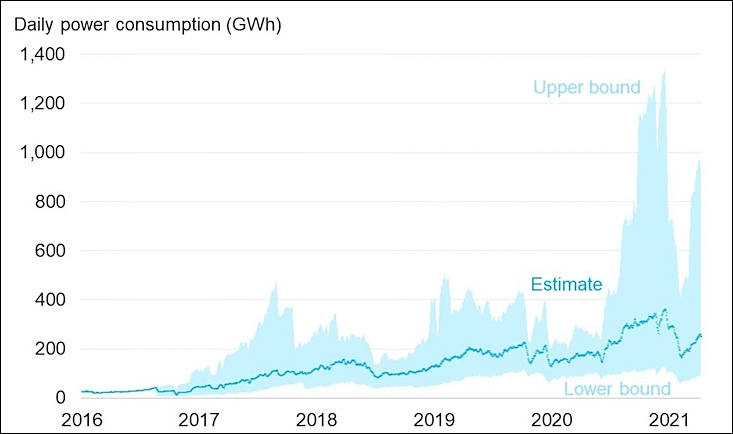
According to researchers, in 2020, about 67 TWh of energy were spent on mining and conducting transactions in bitcoins around the world. This figure has already been exceeded this year. It is assumed that by the end of 2021, the energy consumption of the Bitcoin network will be 91 TWh, which roughly corresponds to the energy consumption of the entire Pakistan.

 sa18280.jpg733 x 434 - 33K
sa18280.jpg733 x 434 - 33K -
I'm sure all of that electricity is from solar and wind
-
Economists at the Central Bank of the Netherlands, together with engineers at the Massachusetts Institute of Technology, have calculated that every bitcoin transaction generates the same amount of e-waste as recycling two iPhones.
“The lifespan of Bitcoin mining devices is still only 1.29 years. As a result, they estimated that the entire Bitcoin network currently generates 30.7 kilotons of e-waste annually. This value is comparable to the amount of electronic waste of small information and telecommunications equipment in a country like the Netherlands, ”says the researchers' report.
Economists estimate that 112.5 million transactions were processed on the bitcoin network in 2020. Based on this, they were able to establish that each individual transaction using the most popular cryptocurrency generated at least 272 grams of electronic waste, which is comparable to the weight of a pair of Apple smartphones.
-
Electricity consumption in the retail sector of the Irkutsk region may grow by the end of 2021 by 159% in annual terms due to a significant increase in the consumption of cryptocurrency "black" miners. This is stated in a letter from the head of the region, Igor Kobzev, addressed to Deputy Prime Minister of the Russian Federation Alexander Novak (TASS got acquainted with a copy of the document).
"With the average electricity consumption [by the population] over the past four years at the level of 5.9 billion kWh, in the first half of 2021 alone, consumption amounted to 4.7 billion kWh, which in terms of a full year gives an increase of 159%.
According to the guaranteed supplier, 1.4% of households in the region consume 26% of the total consumption of the population, "Kobzev explained.
He added that the placement of mining equipment from China, where a ban on the mining of cryptocurrency was introduced, is placing an additional load on the region's energy system. According to the head of the Irkutsk region, the rapid growth of energy consumption can negatively affect the amount of cross-subsidization and requires containment with a simultaneous outstripping growth in investment in the region's power grid complex.
"The above circumstances during the period when the power system of the Irkutsk region passes the upcoming period of maximum loads will form extreme operating modes of distribution and main power grids with high risks of complex accidents and emergencies," the governor added.
Howdy, Stranger!
It looks like you're new here. If you want to get involved, click one of these buttons!
Categories
- Topics List23,992
- Blog5,725
- General and News1,354
- Hacks and Patches1,153
- ↳ Top Settings33
- ↳ Beginners256
- ↳ Archives402
- ↳ Hacks News and Development56
- Cameras2,367
- ↳ Panasonic995
- ↳ Canon118
- ↳ Sony156
- ↳ Nikon96
- ↳ Pentax and Samsung70
- ↳ Olympus and Fujifilm101
- ↳ Compacts and Camcorders300
- ↳ Smartphones for video97
- ↳ Pro Video Cameras191
- ↳ BlackMagic and other raw cameras116
- Skill1,960
- ↳ Business and distribution66
- ↳ Preparation, scripts and legal38
- ↳ Art149
- ↳ Import, Convert, Exporting291
- ↳ Editors191
- ↳ Effects and stunts115
- ↳ Color grading197
- ↳ Sound and Music280
- ↳ Lighting96
- ↳ Software and storage tips266
- Gear5,420
- ↳ Filters, Adapters, Matte boxes344
- ↳ Lenses1,582
- ↳ Follow focus and gears93
- ↳ Sound499
- ↳ Lighting gear314
- ↳ Camera movement230
- ↳ Gimbals and copters302
- ↳ Rigs and related stuff273
- ↳ Power solutions83
- ↳ Monitors and viewfinders340
- ↳ Tripods and fluid heads139
- ↳ Storage286
- ↳ Computers and studio gear560
- ↳ VR and 3D248
- Showcase1,859
- Marketplace2,834
- Offtopic1,320





